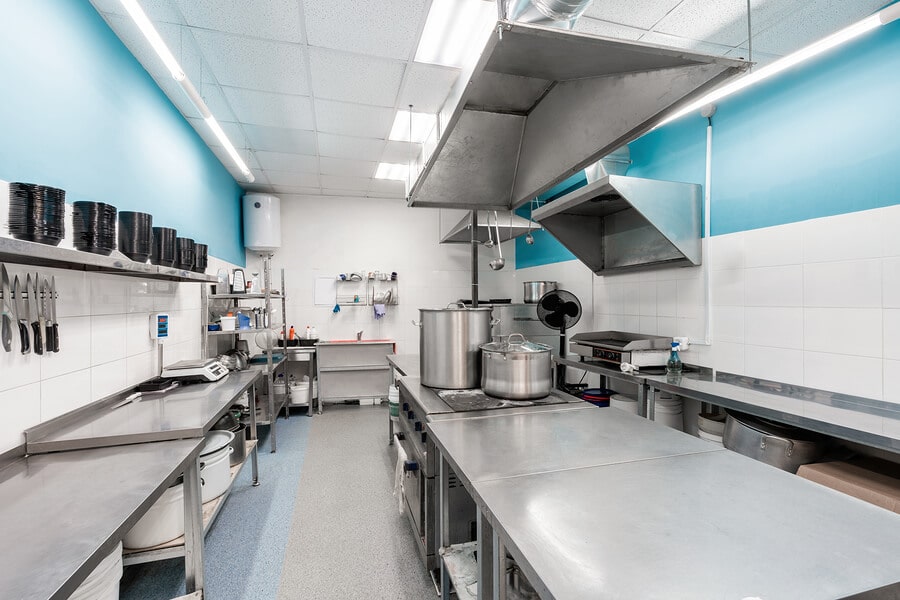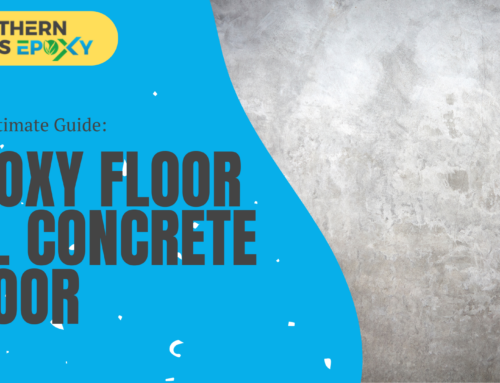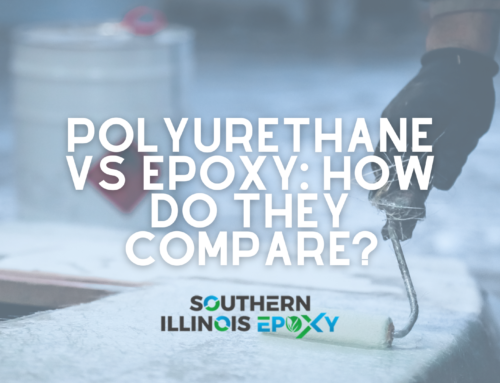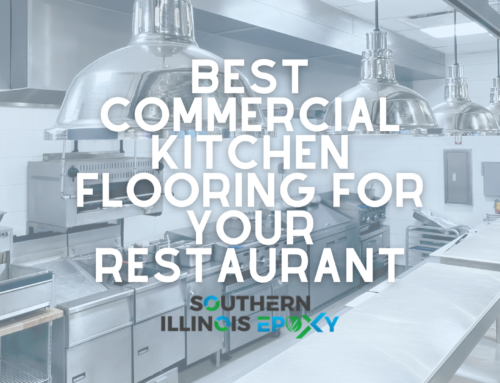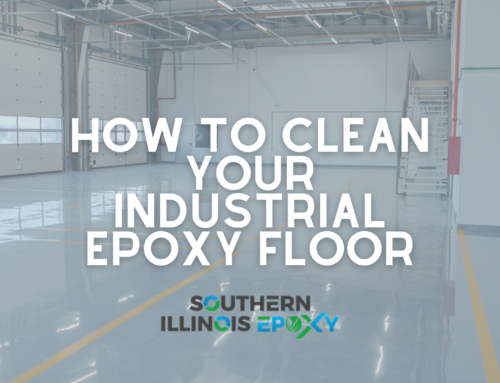Commercial kitchen flooring is a subject that needs to be approached carefully. Since many commercial kitchens serve food to hundreds of people a day, a great amount of care and effort needs to go into play so that establishments can protect their patrons’ and employees’ health (and to comply with state, federal, or county health guidelines). While there is some debate as to what the best restaurant kitchen flooring is, there are a set of guiding principles that directs each establishment towards the ultimate goal of food safety. Here is the latest health & hygiene guide for commercial kitchen flooring requirements.
What are the Flooring Requirements for Commercial Kitchens?
Commercial kitchen floors need to be tough. Steady cleanings and flows of water, hundreds of spills, heavy cooking oils and large industrial tools, large amounts of foot traffic, and high temperatures are just a few of the things that your commercial kitchen floor will be up against. Your flooring materials, therefore, must have a high degree of chemical resistance, be easy to clean, safe for food preparation, and offer impact resistance and slip resistance. Commercial kitchen flooring requirements are naturally strict, as it not only protects the people that are walking on the floor but, the people who are eating the food that comes out of the room with the flooring.
For commercial kitchens, there are clear flooring requirements for all establishments that offer food for sale to the public. According to Illinois law, “floors shall be made of smooth, nonabsorbent, easily cleanable materials and smooth, nonabsorbent, and an easily cleanable cove baseboard”.
You can see the similarities in other state laws as well. For example, the California Retail Food Code states that “Except in sales areas and as otherwise specified in the subdivision, the floor surfaces in all areas in which food is prepared, prepackaged, or stored, where any utensil is washed, where refuse or garbage is stored, where janitorial facilities are located in all toilet and handwashing areas shall be smooth and of durable construction, and nonabsorbent material that is easily cleanable.
Floor surfaces shall be coved at the juncture of the floor and wall with a 3/8 inch minimum radius coving and shall extend up the wall at least 4 inches, except in areas where food is stored only in unopened bottles, cans, cartons, sacks or other original shipping containers.”
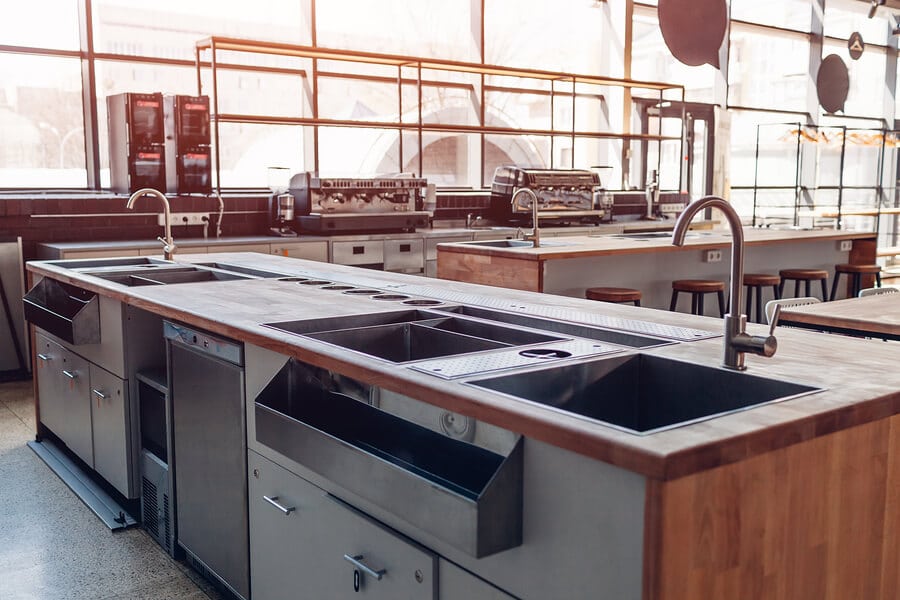
Commercial Kitchen Flooring Requirements
For areas like bakeries, bars, sculleries, meat & fish prep areas, commercial kitchens, walk-in fridges, or any area with a power wash down, there are a few options that you can choose from. These kitchen floors need to be able to withstand absolutely anything that a commercial food environment can throw at them. We took a look at three types of commercial flooring solutions for kitchens, which were:
- Epoxy Flooring
- Quarry Tile or Ceramic Tile
- Commercial Vinyl
To handle the high pressure environment of the food service industry, your floor is going to need to meet some well-defined criteria. Let’s see what the commercial kitchen flooring requirements are:
Moisture Resistance
Your floor is going to need to handle moisture, water, and spills in a kitchen. Humidity, steam, and water vapor are going to be generated from activities such as dishwashing, cooking, liquid spills, clean ups, and refrigeration condensation. Moisture vapor transmission can also occur from soil underneath the slabs of the foundation or from the concrete substrate itself. Proper flooring will help prevent moisture vapor transmission, which will save you thousands in damages and repairs when it comes to your kitchen flooring.
For something to be moisture resistant, your floors will need to be non-porous, meaning they cannot allow water or moisture to seep through.
Thermal Shock
Your floor needs to have a level of thermal shock resistance. This means that your floor needs to be able to survive the wide range of temperatures that a commercial kitchen experiences. This could mean extreme temperatures such as a frigid walk-in freezer and a pot of boiling hot water. The intense heat of dishwashing stations, cookers, hot spray washing, and steam cleaning can cause the flooring substrate to contract and expand in relation to the temperature.
Your flooring system needs to be thermal shock resistant, which means it needs to be capable of expanding and contracting in a similar way to the flooring substrate underneath, so it does not cause cracking or splitting of the substrate. For a flooring solution to remain completely bonded to the concrete slab, professional and careful work needs to occur. If the flooring solution reacts differently to heat or cold than the concrete slab does underneath, it can cause a separation of the flooring solution from the concrete foundation.
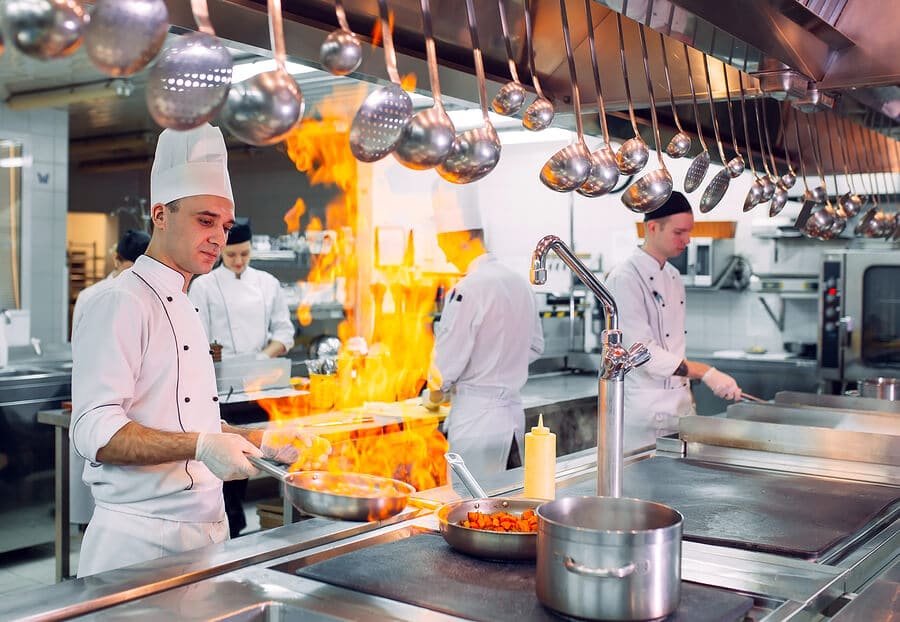
Chemical Resistance and Flooring Durability
Many commercial kitchens will have a fryer, oven, or broiler that can emit hot temperatures and oil/grease. Spilled substances like sugar, salt, or flour can act very abrasively towards the floor when stepped on. Harsh cleaning chemicals will wear away at the surface of many things. Your flooring solution cannot be one of them.
Dishes and plates will be dropped. Deep cleans will occur. Many flooring materials will blister, peel back, indent, or crack under this pressure. This will expose the concrete slab underneath (which is porous). This is not good for business, as it will be a costly repair and cause probable worker downtime.
Slip Resistance
One of the most important commercial kitchen flooring requirements has to be the slip resistance of the floor. A yellow wet floor sign is simply not enough for the fast-paced environment of a commercial kitchen. Many floors may boast that they are slip resistant, but only a few solutions actually hold up in practice.
Cleaning procedures are going to differ from kitchen to kitchen, and establishments that have equipment like fryers and ovens will need to have more stringent routines. So one flooring solution may be considered too highly raised with its anti-skid additives. This is why a solution such as epoxy can fit the bill for all types of kitchens.
Hygienic and Easy to Clean
Your floors need to be easy to clean. Bottom line. Food, spills, and food waste will be hitting the floor every day, so a floor that is easy to clean is a must. Many tiles and grouted floors present a lot of nooks and crannies for bacteria and food to hide in, which is why a seamless floor-to-wall cove base is the preferred method of flooring. A USDA compliant surface must pass tests by food inspectors while preventing moisture from seeping through to the porous concrete underneath.
Creases and seams should be avoided due to their unsanitary conditions. A monolithic flooring system such as epoxy is able to remove this problem due to its design.
Epoxy – The Best for Commercial Kitchen Flooring Requirements
While we measured the effectiveness of all three floors, epoxy flooring met all of our criteria. It was easy to clean, hygienic, slip resistant, durable, chemical resistant, and thermal shock resistant. Epoxy for kitchen floors happens to be all of the above:
- Chemical resistant
- Slip resistant
- Thermal shock resistant
- Hygienic
- Antimicrobial
- Durable
- Moisture resistant
- Monolithic and seamless
Epoxy is the clear choice for all of your commercial kitchen flooring requirements. While vinyl and tile are cheaper options, they lack the durability and longevity that epoxy has. Epoxy is incredibly sanitary and meets all USDA standards for commercial kitchen flooring requirements. Tiles and vinyl can chip, while epoxy is nearly indestructible.
Live in Southern Illinois and need epoxy flooring for your commercial kitchen? Contact us today!


